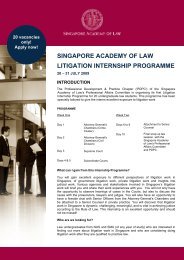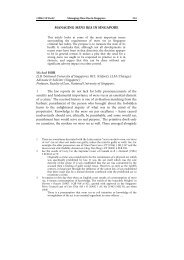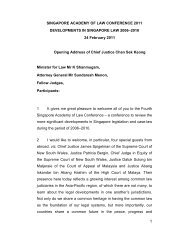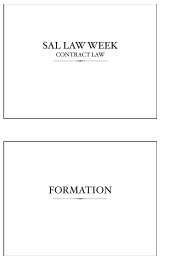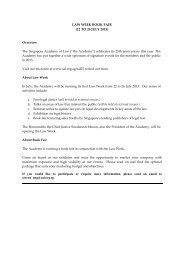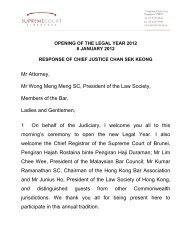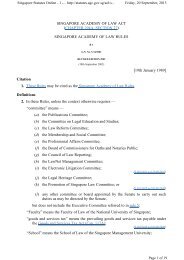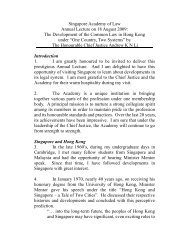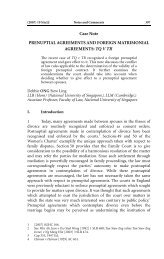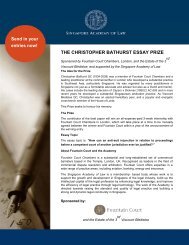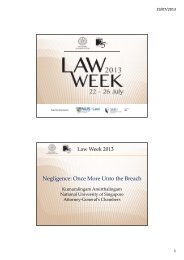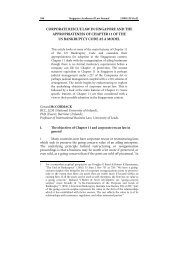View Article - Singapore Academy of Law
View Article - Singapore Academy of Law
View Article - Singapore Academy of Law
You also want an ePaper? Increase the reach of your titles
YUMPU automatically turns print PDFs into web optimized ePapers that Google loves.
15 SAcLJ Matrimonial Assets and the 3 rd Party 277<br />
parties should not be compelled to litigate against persons whom they do<br />
not wish to engage in litigation with. In this regard, see the case <strong>of</strong> Tajjul<br />
Ariffin bin Mustafa v Heng Cheng Hong, 104 where the court stated:<br />
“(4) Generally, in common law and chancery matters, a plaintiff<br />
who considers that he has a cause <strong>of</strong> action against a defendant is<br />
entitled to pursue his remedy against that defendant alone and he<br />
cannot be forced to pursue his remedy against other persons who<br />
he has no wish to sue. (See Per Wynn-Perry J in Dollfus Mieg et<br />
Compagnie SA v Bank <strong>of</strong> England.)…<br />
(6)… a defendant against whom no relief is sought by the<br />
plaintiff will generally not be added against the wishes <strong>of</strong> the<br />
latter. (See Hood-Bars v Frampton & Co.).<br />
…he [the plaintiff] should be allowed to proceed against the<br />
defendant <strong>of</strong> his choice…There may be cogent reasons for his<br />
not wanting to proceed against the intended second defendant;<br />
for example the intended second defendant, who is alleged by<br />
the defendant to have been wholly or partly at fault, may be a<br />
friend or next <strong>of</strong> kin <strong>of</strong> the plaintiff, or the joinder may result in<br />
unnecessary prolongation <strong>of</strong> the trial or in the plaintiff having to<br />
shoulder the burden <strong>of</strong> additional costs should he fail against<br />
both the defendants. There may, <strong>of</strong> course, be other reasons.”<br />
(per Edgar Joseph JR SCJ)”<br />
4.10.3 Where 3 rd party/other parties apply for joinder<br />
161 If the 3 rd party himself, after having been given due notice <strong>of</strong> the<br />
proceedings, applies to join the proceedings, or if either the husband and<br />
wife apply to join the 3 rd party to the proceedings, the test for whether to<br />
allow the appplication will be whether the 3 rd party’s proprietary or<br />
pecuniary rights would be affected by the court’s decision. (See the cases<br />
<strong>of</strong> Pegang Mining, Pelangi Airways, Chang Ching Chuen and Gurtner v<br />
Circuit, supra, discussed in Section 4.4.1(b) above). The factors<br />
discussed in paragraph 4.10.1(a)-(c) would also be relevant.<br />
104<br />
[1993] 2 MLJ 143



